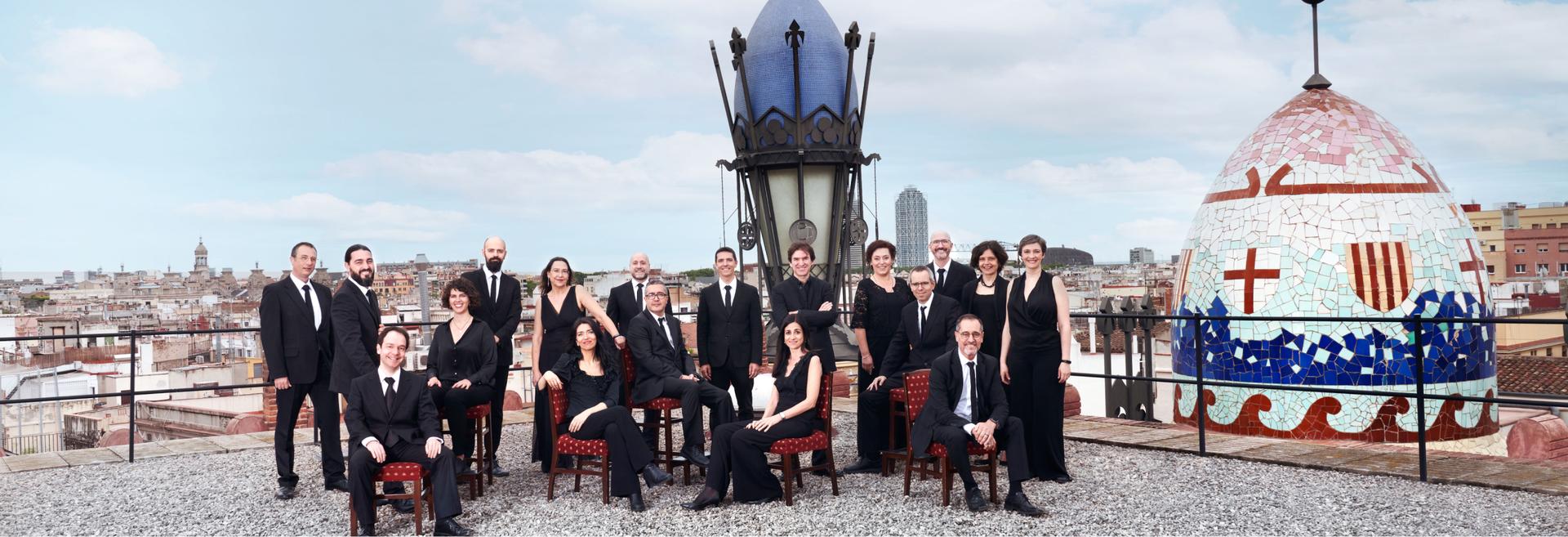Cor de Cambra
The Choir
Hearing the voices of the Cor de Cambra of the Palau de la Música Catalana is exciting and the way they experience music is simply amazing. Thanks to its high level of artistry and professionalism, the choir crosses borders to become an international benchmark.
The intention of the Cor de Cambra is to nurture international choral music, to foster the rediscovery of Catalan musical heritage and to encourage new work. A richness of style and performance ranging from Renaissance composers to world premieres by contemporary composers. From a cappella music to operatic productions and the great symphonic-choral repertoire, always with maximum versatility and no limits.
The Cor de Cambra of the Palau de la Música Catalana was founded in 1990 by the Orfeó Català and is currently supported by the Department of Culture and Media of the government of Catalonia and the Fundació Orfeo Català-Palau de la Música Catalana. It has won the Catalan government’s National Music Prize. It works with the most prestigious orchestras and national and international opera companies, and with the leading conductors of the 21st century. The choir has recorded for record labels, radio and television.
Booking the Choir
Tel.:+34 93 295 72 30
[email protected]
Contact:
[email protected]
Biography
The chamber choir at the Palau de la Música Catalana, the Cor de Cambra, is one of the most prestigious professional choirs in Spain. The choir was founded by the Orfeó Català in 1990 with the goal of sharing universal choral music, helping to recover Catalan musical heritage and encouraging new compositions. Former choir directors include Jordi Casas i Bayer, Josep Vila i Casañas and Simon Halsey. Xavier Puig currently directs the choir, while Jordi Armengol is the choir pianist.
All the choir members are required to have excellent vocal and artistic skills, which means the group has the musical abilities of a truly great choir. It has been conducted by prestigious conductors such as René Jacobs, Marc Minkowski, Kent Nagano, Simon Rattle, Gustavo Dudamel, Daniel Barenboim, Christophe Rousset, Vladimir Jurowski, Daniele Gatti, Simon Carrington, Eric Whitacre, Harry Bicket and Fabio Biondi, and has collaborated with singers Philippe Jaroussky and Mark Padmore. The ensemble has been a member of The European Network for Professional Chamber Choirs (TENSO) since 2010.
The Cor de Cambra has performed throughout Spain and further afield, including at the BBC Proms in London and the MÜPA Festival in Budapest. Notably, the choir performed in Los Angeles (USA) at the start of the choir’s international tour, giving a rendition of Beethoven’s opera Fidelio with the LA Phil, under the baton of Gustavo Dudamel (2024). Also noteworthy are the choir’s own works, El cançoner popular contemporani (2022), commemorating the centenary of the Obra del Cançoner Popular de Catalunya, Un cant a la natura. Un crit a la terra (2023), Una Schubertíada (2024) and Canto la lluita... i l'amor, dedicated to the centenary of the poet Joan Salvat-Papasseit (2024). Further highlights from 2025 include the choir’s collaboration with Thomas Hengelbrock’s Balthasar Neumann Chor, with the programme Romanticisme coral i Escola de Montserrat, conducted by Xavier Puig, and the concert with cellist Nicolas Altstaed, performing Stabat Mater for choir and cello, conducted by Júlia Sesé, as well as the début of a work by Raquel García-Tomás.
The 2025-26 season will feature a tour with the Il Gardellino ensemble and conductor Chistroph Prégardien, taking J.S. Bach’s Christmas Oratorio to stages in cities in Spain and further afield (Antwerp and Amsterdam), including a performance in the Palau in December 2025. The Cor de Cambra will also return to Los Angeles (USA), together with the Orfeó Català and the Los Angeles Philharmonic, conducted by Gustavo Dudamel, with a concert featuring Beethoven's Missa solemnis in February 2026. Also worthy of note is the new production Judici a Gesualdo, to be sung on stage alongside pianist Marco Mezquida, featuring works by Carlo Gesualdo and Mezquida himself. The Cor de Cambra will also take on J.S. Bach’s Mass in B minor, with the baroque orchestra Vespres d’Arnadí, participate in concert with compositions by contemporary Catalan choral composers, and give the début performance of a work by Gabriela Ortiz.
The singers
The goal of the Cor de Cambra has been the same ever since it was set up: to cultivate and foster chamber choir practice while building up the standard of its members and raising its profile as high as possible.
The choir is made up of four sopranos, four contraltos, four tenors and four bass-baritones, who were admitted to the choir after successfully passing entrance tests. These tests assessed their knowledge of singing and reading music.
Once admitted to the choir, the singers must join in with a system of work and commitment which involves study, regular and special rehearsals, concerts and tours. In addition, every member of the choir is also a soloist and can sing both in the ensemble and in smaller groups.
The musical director, when the repertoire or other musical circumstances demand it, can split the choir or even increase the number of its members on an occasional basis.
Sopranos
Belen Barnaus*
Natàlia Casasús i Magriñà
Araceli Esquerra i Freixa
Míriam Garriga i Pujol
Contraltos
Assumpta Cumí i Martí
Mariona Llobera i Trias
Magda Pujol i Vers
Tenors
Aniol Botines i Martínez
Josep Camós i Roquet
Carles Prat i Vives*
Marc Rendon Gaya
Basses
Esteve Gascon i Martorell
Daniel Morales i Teixidó
David Pastor i Pi
German de la Riva Herrera
* Col·laboradors estables del Cor de Cambra
